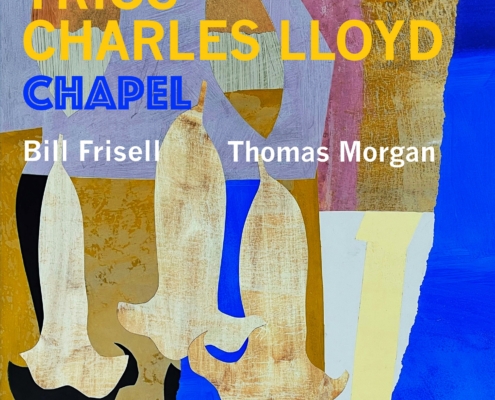Charles Lloyd – Trios: Chapel
- Bloodcount (Billy Strayhorn) 7:21
- Song My Lady Sings (Charles Lloyd) 8:57
- Ay Amor (Villa Fernandez Ignacio Jacinto) 7:14
- Beyond Darkness (Charles Lloyd) 9:46
- Dorotea’s Studio (Charles Lloyd) 12:16
Charles Lloyd – alto and tenor saxophone, Bill Frisell – guitar, Thomas Morgan – bass
Saxophonist Charles Lloyd ist musikalischer Freigeist und Visionär, seit mehr als sechs Jahrzehnten Unikum der internationalen Musikszene und mit 84 Jahren noch immer im Vollbesitz seiner kreativen Kräfte. So produktiv wie eh und je veröffentlichte Lloyd 2020 mit „8: Kindred Spirits“ ein Live-Album, das sich in zahlreichen Album-Bestenlisten des Jahres wiederfand, aufgenommen anlässlich seines 80. Geburtstag im Jahr 2018.
2021 erschien das Album „Tone Poem“, das dritte Werk seines Ensembles Charles Lloyd & The Marvels, einem genreübergreifenden Quintett mit Bill Frisell an der Gitarre, Greg Leisz an der Pedal Steel-Gitarre, Reuben Rogers am Bass und Eric Harland am Schlagzeug.
Mit „Trios: Chapel“ eröffnet Charles Lloyd jetzt ein ungewöhnliches Trio-Projekt, das insgesamt drei thematisch zusammenhängende Alben umfasst, die ihn jeweils in einer anderen Trio-Besetzung präsentieren – ein „Trio of Trios“. Das erste Album nahm er mit Gitarrist Bill Frisell und Bassist Thomas Morgan auf, das zweite Album „Ocean“ (erscheint am 26. August) mit Gitarrist Anthony Wilson und Pianist Gerald Clayton, das dritte, „Sacred Thread“ (erscheint am 28. Oktober), mit Gitarrist Julian Lage und Schlagzeuger Zakir Hussain.
Charles Lloyd – Trio of Trios
Trios: Chapel | 24. Juni 2022
Trios: Ocean | 26. August 2022
Trios: Sacred Thread | 28. Oktober, 2022
INFO
Charles Lloyd has long been a free spirit, master musician, and visionary. For more than six decades the legendary saxophonist and composer has loomed large over the music world, and at 84 years old he remains both at the height of his powers and as prolific as ever. Early on Lloyd saw how placing the improvised solo in interesting and original contexts could provoke greater freedom of expression and inspire creativity. And while he has recorded many classics of jazz in a piano, bass, and drums combination — the latest Passin’ Thru from 2017 — all the while he has been open to, and has searched for, alternative ways to frame his improvisational skills.
This has formed a fascinating counterpoint to his work with his quartet; a few examples might include his early days in Memphis when he regularly jammed with pedal steel guitarist Al Vescovo. Later, during his period as music director for the Chico Hamilton Quintet he used flute (and tenor), trombone, guitar, bass, and drums. More recently there has been an album in duet with drummer Billy Higgins, while the configuration of one of his current groups, The Marvels, has both guitar and pedal steel guitar with bass and drums.
As a sound seeker, Lloyd’s restless creativity has perhaps found no greater manifestation than on his latest masterwork, an expansive project that encompasses three individual albums that are connected by an overarching theme with each presenting him in a different trio setting—a Trio of Trios. The first, Trios: Chapel, features Lloyd with guitarist Bill Frisell and bassist Thomas Morgan. The second, Trios: Ocean, with guitarist Anthony Wilson and pianist Gerald Clayton. The third, Trios: Sacred Thread, with guitarist Julian Lage and percussionist Zakir Hussain.
It should come as no surprise that each of the configurations that feature in the Trio of Trios set involve a deft change of musical context. Borrowing author Antonio Di Benedetto’s apposite term, these trios of expectation open with the Chapel Trio, named after its inaugural performance in December, 2018, at Coates Chapel in San Antonio.
Frisell had already cemented his relationship with Lloyd as a charter member of The Marvels when he was invited by Lloyd to join him in a special concert at Coates Chapel on the Southwest School of Arts campus in San Antonio at the end of 2018. Lloyd was already familiar with the acoustic properties of the chapel, and knew it would not support drums or percussion. He was also aware of Frisell had recorded in a duo context with Morgan, with whom he had developed a close musical rapport, and suggested they might all come together as a trio.
Recorded live, for a while it seemed as if the Coates concert would become maiden voyage and farewell tour all in one. The global pandemic brought the world to a standstill for the best part of two years, but in December 2021 the trio were reunited for a concert at the Pierre Boulez Saal in Berlin, suggesting they may continue to sprinkle their magic into the future. Even so, the Coates concert left an indelible impression on Lloyd, who later said, “Our first performance has always had a magical place in my memory bank.”
And magical it was. Opening with Billy Strayhorn’s “Blood Count,” originally a feature for the late Johnny Hodges with the Duke Ellington Orchestra, it is a performance that can only be described as heartfelt. Lloyd’s mother ran a rooming house in Memphis, and Lloyd’s childhood memories are filled with impressions of musicians from the touring big bands who stayed there — the Jimmie Lunceford Orchestra, and Duke Ellington’s Famous Orchestra especially. His memories of meeting Johnny Hodges as a youngster are particularly vivid. While the present thinks it knows it all, the past — here in terms of memories, dreams, and reflections — had a casting vote in shaping the destiny of this performance.
Frisell’s accompaniment is perfect for this trio setting; the essence of his unique sound signature lies less in what he does, more the manner in which he does it. He introduces “Song My Lady Sings,” a Lloyd original dating from 1966, allowing Morgan to share the foreground before Lloyd’s entrance outlining the graceful melody that mutates into a series of eloquent musical arabesques that culminate in a double-time coda and the realization this has been Lloyd’s finest performance of the song. “Ay Amor” is by the Cuban singer, songwriter, and pianist Bola de Nieve, born Ignacio Jacinto Villa Fernández (1911-71), who was a top cabaret singer and a composer fluent in many languages. His version of “Ay Amor” was recorded in Spanish as a rhapsodic lament. Lloyd obliquely acknowledges the composer’s intent in his exposition of the melody before re-imagining it in new contours, subtly implying the exotic in terms of melody and rhythm as he claims the song as his own.
The unspoken rule about the trio’s collective improvisation seems to be that no-one refuses what another proposes, so that “Beyond Darkness,” featuring Lloyd on flute, begins as a fractured melodic line, but as it is embellished, extended, and developed it grows into a pinnacle of dramatic possibilities, climaxed by a flute cadenza as coda. “Dorotea’s Studio” is the workspace of Lloyd’s partner and soul mate, Dorothy Darr. Introduced by Frisell, Lloyd’s exposition of the melody to an implied Latin rhythm is developed through a series of motifs, inversions, and inter-connecting phrases that are here, perhaps, richer and more varied, forming the basis of a graceful climax to a memorable concert.
If culture is devalued through overproduction, and a throwaway society is a sure sign of this, then this music, indeed this Trio of Trios, provides the perfect riposte — it is music that, quite simply, is enduring and will stand the test of time.
Weitere Infos in unserem Presseportal unter
https://journalistenlounge.de – bitte dort über den Genrefilter „Jazz“ anwählen!
Radio
Rosita Falke Media Promotion
info@rosita-falke.de, Tel: 040 – 413 545 05
Blue Note / Universal Music
CD 00602445266494 / LP 00602445266500
VÖ: 24.06.2022

